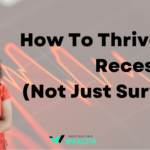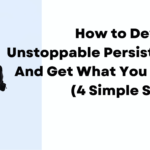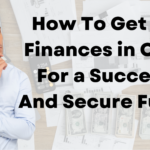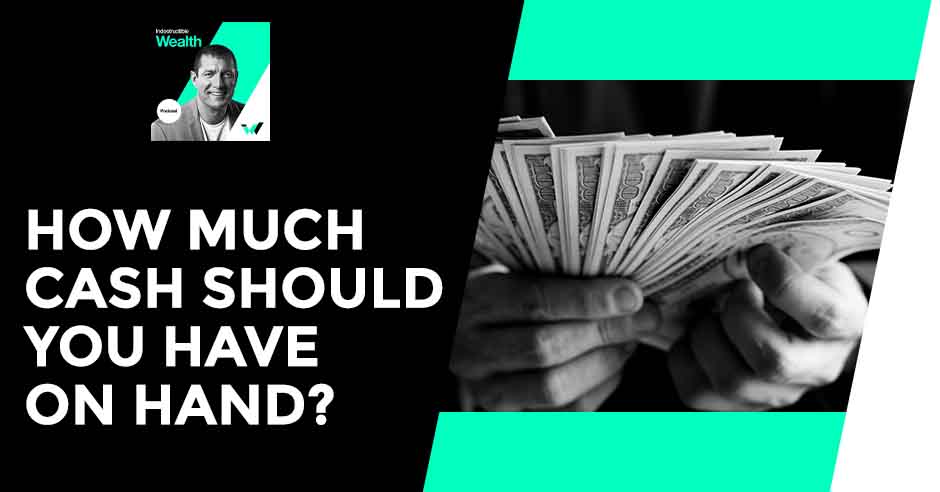
The four ways I ensure I have cash, and accessible liquidity, in case of emergencies, while I continue to build Indestructible Wealth. Tune in and find out how you can do it, too.
My book, Building Indestructible Wealth: The Six Figure Earners Guide to a Multimillion Dollar Portfolio, just launched. Get your print and audiobook copies and a few other timely insights into what to invest in right now at this link: https://bit.ly/3xjGFQ7.
Do you have a question you would like me to answer on the podcast? Follow me on IG: @indestructiblewealth and send a message, or visit me at www.MyIndestructibleWealth.com for more resources (and check out the new blog page while you are there!).
—
Table of Contents
Listen to the podcast here
How Much Cash Should You Have On Hand?
We are finally back from Cabo, Mexico. We had quite the experience coming back from the airport. When we landed in Chicago, we were driving through a busy part of Chicago, South on 294, and there was construction. We go around a turn and they shift the lanes a little bit. The car that was right next to us didn’t apparently know or want to shift lanes. They ran right into the backside of our car. I didn’t know what to do. What do you do in that situation? We couldn’t pull over.
There was nothing there to pull over on. I’m like, “Relax. Think. We’re okay. Our car got sideswiped. What do we do? How do I handle this? I need to get this car over so we can assess the damage and get the cops there to file a police report, a crash, so you take that to the insurance.” We’re on the South side of Chicago. The reputation there is not known for safety. How do I play this? What do you guys do? We watched the car that was behind us. We slowed down to try to get it to pass so that we could signal to them to pull over.
As we slowed down, they slowed down even more to the point where we were disrupting traffic flow. It wasn’t good. We keep going. She’s trying to snap a picture of their license plate. It’s midnight. We’re both extremely tired. Finally, the car weaves over to the other lane and uses a semi to try to get away. I’m like, “I know what you’re doing, you fucker.” I take off after him, I pull up behind him, flashing my lights, like, “Pull over.” They pulled off the highway onto an exit, but then they wouldn’t pull over. I don’t know if they’re trying to dodge me.
They’re probably scared of who’s in my car, as much as maybe I’m scared of who’s in their car. It’s not worth getting shot over. We get the 911 on the phone. I’m explaining the situation. They’re like, “Let them go. That’s not worth it. You got their license plate. Pull over somewhere safe. We’ll send a police car over to do a report.” We pull over and I get out in a Culver’s parking lot. There’s nothing except a little scratch and some residue from their bumper. I was expecting this huge gouge, several thousand worth of damage. A few minutes later, the cop shows up. I’m feeling dumb. I’m like, “I should’ve called them off and gone home,” but he shows up.
I’m like, “You’re here. I know this isn’t bad, but if you could file a police report just in case, we get hit with a bigger bill than what we think for this scratch or if there’s any internal damage, God knows what might’ve happened.” He fills out the report. It took forever it seemed. Finally, we get the report. He’s like, “There’s nothing I can do. What do you want to do? You want me to go after them for a scratch on your car? It’s going to be a hard time proving that they did it.” Anyway, that was our adventure coming home. I got to say I am tired of travel. I want no more trips. I know that sounds terrible. Don’t go on and give me a one-star review for saying that.
Since June 2022, we’ve been in Cancun for a week, Detroit a week, Wisconsin Dells for a week with the fam, then Cabo, and now we’re renting out a lake house. This one, I don’t consider a trip. It’s twenty minutes from our house. We get to chill out, totally relax, jet ski, and boat with the fam. We try to do that trip every year. That’s where we’re at. I’m wondering why I can’t get shit done. I can barely keep up with anything on getting the show out. I go behind on everything. Now I’m looking at this travel schedule. Have some grace with yourself, Jack.
I’m not where I want to be on this platform. I’m being totally transparent. I’m always honest, open, and authentic with my audience. I feel that’s the best way to help you guys work through your situations because I’m sure that most of you reading are probably saying the same thing, “I’m not where I want to be at this point. I don’t think I’m where I should be at this point based on how much work, effort, energy, and time that I put in.”
You have to look at growing your business and investments. Like airline pilots, we’re flying on planes left and right for the last few months. Who do I want to get on the plane with? Do I want the pilot who had 1,000 hours of experience and he’s been in for a couple of years, or do I want the guy who’s been around for 20 years as a pilot, but he has 50 hours of flying experience? It’s not so much how long of the time that you’ve been in since you started. It’s how many hours you have logged.
If I look at how many hours I’ve logged into this business, I’m probably right where I should be based on the time that I’ve put in. Stop, look at that, consider that. It’s not timing the market. It’s time in the market. It’s the same concept. How long have your dollars been invested? You could say, “I’ve been in stocks for twenty years, but I’ve been in and out multiple times.” How long have you actually been in the market, logging hours, days, and years? That’s what’s going to give you the incredible returns that you’re after, not sporadically coming in inconsistently.
Managing Your Cashflow
Anyways, that’s not what my topic is about. I just wanted to throw that in. My topic is cash management. I had a situation come up that led me to, “This is a great topic because this is something that I personally struggle with.” I don’t think I necessarily have it figured out, but I have a good system down. Even with a good system, guys, there are still struggles that I’m going to talk to you about.
What happened is that I needed to come up with $52,000 in cash to pay the remaining balance on the Bitcoin mining container that we got completed to get our mining operation, all of our machines plugged in, and generate the Bitcoin income. The final amount due is $32,000 higher than what I was originally told the final balance would be a few months ago when we put the down payment on to start it and ordered it due to supply chain issues. Sometimes I wonder if people are making this shit up, but for the parts that we needed, they all came in substantially higher.
My Cash Management System
I was trying to figure out how I was going to come up with this extra cash that I was not planning on and in what way am I going to fund this. I need to pay this balance due because if I don’t, what’s the alternative? If he wants to be a dick, he could say, “You didn’t complete the contract on time. You’re forfeiting this container.” He’s cool. He’s not going to do that. We got to come up with the cash and get this squared away. How do I go about doing that? I’m going to tell you guys about my cash management system and what I’ve done in this. This will be good for you guys because the big question I get asked all the time is, “How much cash should I have on hand?”
Boosting your liquidity can help you confidently navigate the hazards of modern American financial life. Share on XLike everything in finance, the answer is it depends. It depends on a lot of factors, which we’ll talk about. Taking you guys back to the scenario when I first got started in investing. The first major setback that I had with cash management was when my stocks dropped like a rock and the bubble crash of 2000. You guys have heard this story before, I know.
It was obvious to me at that point in time, I had made some mistakes, the obvious ones I’ve talked about, chasing past returns, hyper-focusing my investible cash into a risky speculative asset, but the not-so-obvious mistake and, as it turns out, the far bigger one was a lack of cash management. There will be plenty of times over your wealth-building career that you’ll buy into an asset and then watch that asset plummet.
I hate to tell you this, but you guys know that this is true. Some of you have experienced it already. It’s part of building wealth. I’m sorry to break it to you, but it would be like saying you can go golf an entire round, or even worse, you can golf your whole life and you’re not ever going to end up in the bunker behind a tree as I did or in the bottom of a pond, lake, river, creek, stream, or whatever body of water where you have no shot out. You are going to get a first glimpse of what hazards are. One of those hazards is running out of cash and then having to sell your assets in a down market. The huge mistake that I made was that I invested too much. I was not thinking about future cash drag.
Cash drag is how many months you can go living off the cash that you have before you run out. I don’t like to have cash sitting in the bank. You guys are clear on that. Not only is the purchasing power eroded by inflation, but there are plenty of lost opportunity costs, which is essentially what I’m giving up by taking a certain course of action. That’s opportunity cost.
In the case of uninvested cash, when you see tech stocks cranking up 40% a year back in ‘97, ‘98, and ‘99, that led up to me wanting to put my money to work, looking at it in the bank, making 1% interest or less, your opportunity cost looks a lot like 40%. What I failed to recognize was that in a few short months, my life was about to change more drastically than at any previous point in my life. Beyond having kids, that was the biggest change or transformation that I went through more than any other point over the next two and a half decades of my life up until this point.
I was moving from college student with little to no personal financial responsibility into the real world where I’d be responsible for all of my own expenses. I’d be making my own house payment, buying a new car, insurance, and food. I’d have to buy an ironing board, unless I asked for that for Christmas, which I did, which was maybe one of the most depressing years of my life that moment when I woke up Christmas morning and wrapped was an ironing board and not a Nintendo or some type of G.I. Joe configuration.
I was like, “What? This is what real life is like? Ironing board. This is awful.” The days of being able to bank almost all of my cash were soon to be over. I had not factored in that transition at all. When the stocks did crash and my business dropped and I had monthly bills, I was in a budget deficit. I couldn’t go on and turn on the printing press like our government to solve my problems.
I had to sell assets that I own. The ones I own were stocks, the stocks that had dropped 50% in order to raise cash to live. Otherwise, I could potentially be moving back in with my parents. As much as I love them, I could never let that happen. That would be the mother of the whole crash. I’m aware that there are certain things that when I do on a daily basis, my life is much better.
One of those is reading Scripture and getting my mind right to start my day. Admittedly, I’m consistently inconsistent and I struggle with staying focused. If you put a Bible in my hands, I honestly will probably fall asleep. I’m sorry. I hate to say that, but it’s pretty much how it goes. I have a hard time understanding what they’re trying to say because whatever they’re saying is not what they’re saying.
There are hidden meanings and analogies and stories. You don’t understand the times that they were living in to have context. The best way for me to soak up the wisdom is to read books that have little pieces of Scripture and then modern-day teaching principles all wrapped together. Typically, I only do this for about 10 to 15 minutes when I wake up, one of the books I’m reading is called And Then God Created Golf. It’s a short book to guide the Christian golfer, not only through the mind-numbing challenges of an insanely frustrating and difficult game but through the tough seasons of life.
Here’s a quote I read, “You are a fortunate person indeed if you can begin each day accepting the fact that during the day, there will be ups and downs, good breaks and bad ones, disappointments, surprises, and unexpected turn of events. At the same time, wise golfers have learned to accept those adverse conditions on the golf course as representative of real-life challenges.”
Change a couple of words around and we have the perfect summation of the summary of investing life of managing your cashflow. At the same time, wise investors have learned to accept those adverse conditions in their portfolios as representative of real-life challenges. There are many fundamental traits that go into being a wise investor. There’s a host of traits that we can look at and consider when analyzing whether an investor is wise or foolish.
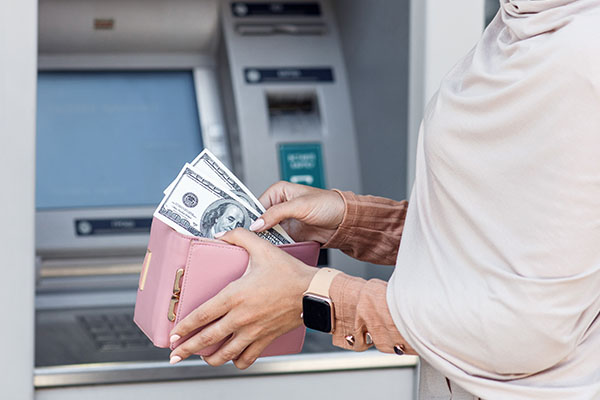
Cash Management: You don’t want to have cash sitting in the bank. Not only is the purchasing power eroded by inflation, but there are plenty of lost opportunity costs.
Professional development, which is consistently focusing on your learning and on increasing skills to increase income, proper asset allocation, or not having all your eggs in one basket, patience, buying things you understand, and holding great assets for long periods of time are all extremely important characteristics of wise investors, but at the top of this list, in my humble opinion, cash management. Several years back, I remember reading a Sports Illustrated article about the widespread financial issues that professional athletes deal with after retirement.
I couldn’t believe the numbers. I did a quick Google search to verify. I don’t believe everything I read. This may or may not be accurate, but I believe, based on other articles that I’ve read on this subject, it’s probably not too far off. It says 78% of highly paid professional athletes go broke after three years of retirement. Clearly, going from not making much money to all of a sudden getting paid millions, and not all professional athletes get million-dollar contracts.
In fact, while I was in Cabo, I’ve been getting to know a successful guy, Tyler, in our direct sales company. He was a former professional Major League player. I’m like, “We’re on a shuttle together for a solid half hour when we got off the plane and rode from the airport in Cabo over to the resort, The Hilton in Cabo.” I’m picking his brain the entire time. I want to know what was the Major League experience like. “How much money did you make? What were the pitfalls? What are the difficulties?”
What we read about is a lot of times different from somebody’s inner perspective. He made pretty good money. He would make $500,000 a year. Maybe one year, he made $1 million. After about five years, he’s out of the game. He said there wasn’t a market anymore for his services because he gets replaced by younger players. Clearly, not all professional athletes make millions of dollars. Going from $500,000 though, to potentially as a Major League player to then going and getting a job or working a business, you’re going to have a several-year period where you’re going to have to probably bank and work your way back up to that type of earning power.
I never will get back to that previous earning power. I will never get close. Look at this, lottery winners, they aren’t in any better shape. Whether they win $500,000 or $1 million or multiple millions, about 70% of lotto winners, and this number is low, lose or spend all that money in five years or less. If you looked over the course of 1 decade or 2 decades, probably closer to 99% are broke.
Projecting future cash needs is not only difficult for the young college-age version of Jack but for everyone else, too. I’ve given this vice out, this is not terrible advice by any stretch. Standard financial mainstream advice says to have six months’ worth of living expenses sacked away in cash as your emergency fund. I fully support this advice.
In fact, I did an Instagram reel where I said the only situations where you should not be investing. This has nothing to do with the markets or the state of the markets. That’s what people think when they probably first read the headline, but the reason they should not be investing is if you’re paying off high-interest debt or if you’re funding your emergency fund.
In those cases, I don’t think you should be investing. You should be focused on those two things because those two things are fundamentals. You’re building your house on rock instead of sand. Here’s the question though, is six months enough, or is it too much? If you have three months of emergency expenses, is that enough? The other three months that you would have banked in cash, you could be investing in getting a return off of.
Here’s the big thing, there are different forms of cash. After all, we want to maximize our return on invested cash and minimize the damage that inflation does to cash sitting on the sidelines. What’s the best answer? A lot of it depends. Let’s unpack what it looks like to have the right mix of cash management. The question that most people ask is, “How much cash should I have on hand?” The more important question to ask is, “How much liquidity should I have?”
Having cash on hand in an emergency fund is typically 1 or 2 things, or maybe both. It’s either actual cash in a safe or under a mattress, which I don’t recommend or cash in a bank account. What I’d like you to start thinking about is in terms of liquidity. Liquidity is simple. It indicates a person or a business company’s ability to pay their debt obligations or their current liabilities without having to raise external capital or take out loans.
Boosting Your Liquidity
High liquidity means a person can easily meet their short-term expenses and debts, while low liquidity implies the opposite and that a person or company could imminently face zero cash situation and possibly even bankruptcy. I want to give you guys four ways to consider boosting your liquidity so you can confidently navigate the hazards of modern American financial life. We know this. You are going to have lots of hazards thrown at you and your financial life. You want to be prepared when they’re thrown your way.
Here’s number 1) cash, as in cold hard physical cash you can touch. Cash in my safe gives me that warm, fuzzy feeling of knowing at a moment’s notice, I can easily access cash. I don’t like to keep a lot of cash on hand, but typically, a month worth of expenses is pretty sufficient, in my view. The reason why we want to have cash is that if shit hits the fan, we want to be able to get something quickly. I can get to my cash fast within a couple of minutes. Each layer that I’m going to give you here guys is we step up. Your cash isn’t quite as accessible. It’ll take a little bit longer to be able to access it.
Compounding is the eighth wonder of the world because it's so incredibly powerful over the course of time. Share on XNumber 2) cash in the bank. I keep enough in my checking accounts for about 2 months, maybe 3 months of expenses since bank accounts pay out a measly 0.01% interest. Since the Fed has been raising rates, I bet you it’s gone up to like 0.02% or 0.03%. I’m sure they’ve been generous in the payouts that they’re giving us on our cash and checking accounts. Probably not. Since they only pay this measly 0.1% interest and then they take my hard-earned cash and loan it out for many multiples of what they pay me, they’re making huge amounts of money on my cash in their bank.
They’re the clear winners. I’m the clear loser in this arrangement. I prefer to give them the least possible amount. I want to be the shittiest high net worth or even low net worth customer the bank can possibly have. By giving them the least amount of my cash sitting there, that’s how I become a shitty customer for them. That’s to your advantage to be the worst customer for a bank you possibly can. You do not want a bank monetizing you because that means that they’re monetizing you, you’re not monetizing yourself.
Number 3) is a HELOC. This is where one might get a little surprised that I’m putting this in this cash management type of outline here. What is a HELOC? It’s a Home Equity Line Of Credit. Most people treat their home equity like an ATM machine. When they want to buy something or they need to buy something, they borrow out their equity, after all, it’s their money, and they tap it for their next luxury vacation or the extravagant kitchen remodel they’ve always wanted to do.
Prior to the 2008 housing crash, Americans were maxing out their home equity to the point where they had no margin for error should housing prices drop. We know how this story ends. With millions of people underwater, meaning you’re underwater because you owe more on the home than the home is worth, and then having to come to the closing table if you need to sell your property with cash to release the mortgage, or worse yet, millions of people got foreclosed and lost their home, their credit, and their pride.
The way I use a HELOC, and I suggest you do, is more of a cash management tool. I open up the HELOC when I don’t need it. That’s the key. When I do need the cash, which I’m never going to use for liability, I’ll only use it for assets or real serious emergencies, then I don’t have to go through the month-long process of applying for loans, the appraisals, financial documents, and signing over the rights to my first-born son. I can drive to the bank and have a check in my hand that day.
What I love about these types of loans is that unless I use them, I don’t pay any interest. If I use it and say, take out the loan and draw against the home equity line of credit, I can pay it back when I have a cash infusion if I choose and I can get rid of that interest payment. How much do I have emergency expenses in my HELOC? Typically, it’s several months of liquidity.
I tapped out my Home Equity Line Of Credit when certain assets went on sale. I pulled out and I used part of that HELOC to be able to buy assets when they went on sale. It’s a great strategy for how to use your HELOC. I still want to leave a portion of my HELOC untapped so that I have that there in case of a real emergency where I need cash. Several months in addition to liquidity are in this.
Where the bulk of my liquidity lies is number 4) a high cash value whole life insurance policy. I’ve said this before about this asset. This is not so much of an investment to me as it is an incredible cash management system. This is where the bulk of my emergency funds reside. Why? It’s because a properly structured whole life policy allows my money to grow at a much higher rate. Mine is growing around a 5.5% after-tax rate. The great thing about whole life policies is the money grows tax-deferred or tax protected.
A return of 3%, 3.5%, which is what I get, turns into 5.5% after taxes are factored in because I don’t ever have to pay taxes when I borrow money out of these policies, or when I tap the liquidity out of my policy. If you guys want more on this subject, go to Episode 15 – How to Make Money in Two (or more) Places at Once. It’s a special interview with a special guest, Rachel Marshall. She does a great job of explaining all the pros and what it looks like when you have one of these specially designed policies.
This protects my family should something ever happen to me, which would certainly disrupt our household earning power in a big way. It also protects my cash from a lawsuit. Whole life policies are not allowed by law to be named as an asset in a judgment. Most importantly though is the liquidity factor. I can call my broker, and within a week, have funds wired to my bank account with no loan application, no credit check, and without worrying about being in debt.
I simply borrow against the collateral inside my policy, which is my cash value. I never have to pay it back out because if I don’t, when I pass, they’ll subtract the amount that I borrowed back out from my overall death benefit. It’s a non-taxable event when you borrow versus when you sell. I can borrow always. That’s the only thing I’ll ever do. I’m never going to cash out my cash value because then I’d have a taxable event.
Consider the difference between borrowing against your policy versus having to sell your stocks. You’re either selling for a loss in a down market, which is about as bad of a financial choice as the predatory fees on credit cards, check cashing businesses, and higher interest rate car loans or you’re selling at a gain, which is then taxed at an ordinary income rate if you’re selling with less than a year of ownership. Maybe even worse than that, you’re interrupting the compounding growth of those assets.
Compounding is the eighth wonder of the world, according to Warren Buffett, because it’s incredibly powerful over the course of time, how much compounding of your money increases your wealth dramatically? That’s four points. I’d love to add a number five to the list, but I can’t. You may be able to guess, cryptocurrency.
Eventually, I’ll be able to, but it’s not ready yet because it’s volatile. At some point in the future, when we have mass adoption, meaning everyone in the world is using crypto throughout their daily lives in some capacity, then and only then will we have stability in this asset. Once an asset is stable, then it will make sense to be able to consider it a form of liquidity, a form of emergency cash, and reserve asset.
With the vast swings in this asset like the one we saw with a 67% drawdown, I’d be a pretty terrible wealth strategy coach to tell you it counts as a reserve asset, but that day is coming potentially faster than what we may think. How did I end up paying for the extra $32,000 bill that I got on this Bitcoin mining container? I was about to tap my whole life policy, which I did not want to do. I want to leave a chunk of that open. I’ve already borrowed quite a bit out of it. I wanted to leave a nice chunk of it available should there be a real true emergency.
I was about to, but I have a house, a property that happened to be closing, and closed in time to where the amount that I needed was perfect. It was the right amount I needed from the proceeds of the sale after paying off the loan that was against it and all the taxes, closing fees, commissions, and all of that to realtors, all that stuff that they take out of my property sale. I hate all those middlemen closing rates, guys. That’s why crypto is going to replace all of those middlemen.
That’ll happen probably within the next few years, creating more money that’s left in our pockets as consumers, as the ones who owned the assets. That’s a different subject for a different episode. I had peace of mind. I wasn’t stressed. There was no anxiety. If I hadn’t had that backup with the liquidity of the whole life policy, then I would have had to wait for this house to close. What happens if it gets delayed another month? That happens to me all the time. I would have had to take other measures, which I didn’t want to do to try to figure out how to get that money raised and pay off the final balance in the final bill.
What is the right amount of liquidity to have on hand? Now you’re asking the right question. It’s more than we think. I have a full year of liquidity when you add up all four of these forms. If you threw in number 5) crypto, which to me is like a bonus. Anything I’m depending upon, but if I needed it, I could go into my Nexo account. I could borrow 10% or 20% of my assets against those. That’s probably not irresponsible, although that money could get called due if crypto were to drop again or crash again. It will be called due. It’s called a margin call.
That is something that I can consider as an extra form of liquidity, even though I would never put it in, rely upon it, or depend upon it by any means. In addition to these four different ways of liquidity, we also have precious metals, which can be converted into cash. We have guns and bullets, which have a lot of value. We have a full-year food supply with a shelf life of 25 years because I want to be prepared for any of the hazards that life throws at me. I would strongly encourage you to be considering the same philosophy. I want to have indestructible wealth.



